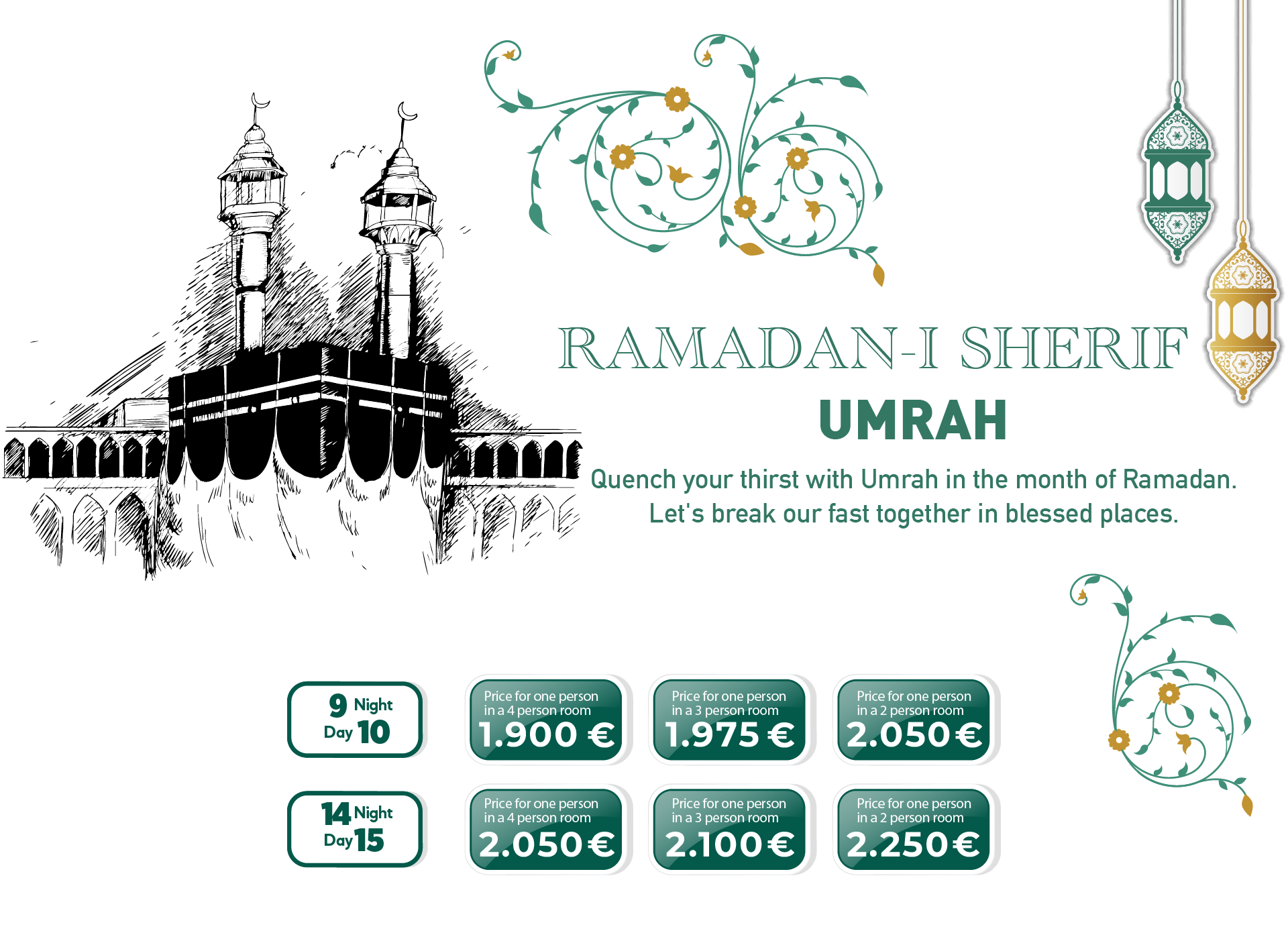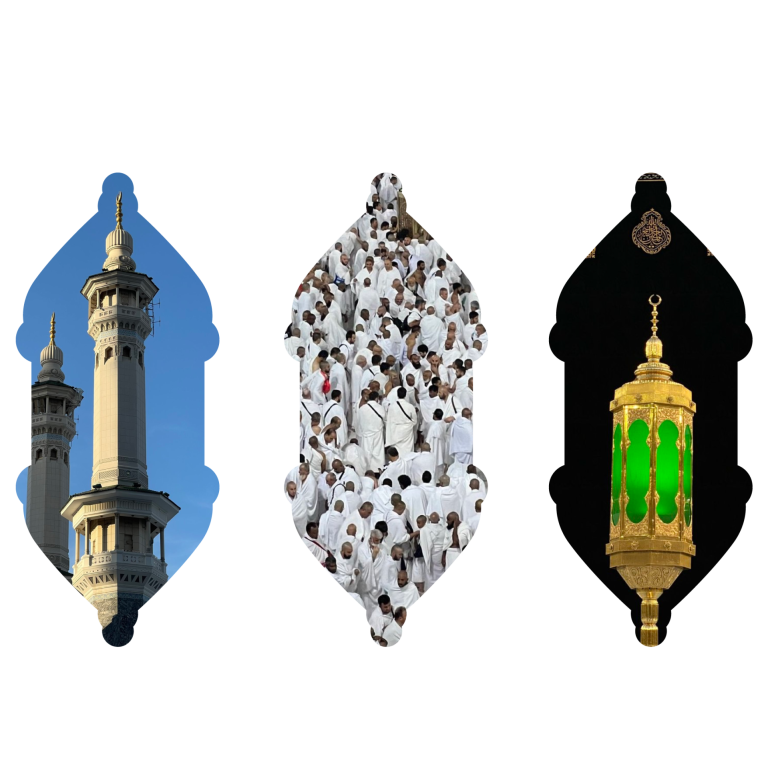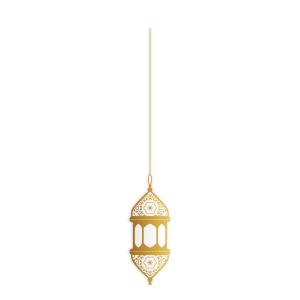

Our Prophet (pbuh) said;
“Umrah performed during Ramadan is considered a complete pilgrimage.
or it can replace a pilgrimage made with me.”
(Bukhari, Muslim, Tirmidhi)

THE IMPORTANCE OF RAMADAN-I SHERIF
Our Prophet (peace be upon him) said:
“Whoever attends a dhikr assembly, Allah Almighty will give him the reward of worship for every step he takes, and he will be with me under the shadow of the Great Throne on the Day of Judgment.”
“Whoever continues to pray in congregation during Ramadan, Allah Almighty will give him a city of light (paradise) for every prayer he performs.”
“Performing Umrah in Ramadan is equivalent (in terms of reward) to performing Hajj with me.”
Allah Almighty will meet thousands of needs of someone who meets the needs of a Muslim during Ramadan. For a person who gives alms to a poor person who has a child, Allah writes a million good deeds for him, erases a million sins, and raises his rank a million times.
Hz. Enes (radiyallahu anh) narrates that the Prophet (peace be upon him) said: “Whoever sets out to meet the needs of his Muslim brother, Allah writes seventy good deeds for him and erases seventy sins with every step he takes until he returns home.” (Nuzhetu’l-Mecâlis)

When Ramadan began, our Prophet (peace be upon him) would release the captives and meet the needs of the people. Anyone who does good deeds in this month will have done countless good deeds throughout the year.
A person who spends the month of Ramadan without praying will spend the whole year in the same way. In this holy month, Muslims should aim to do many good deeds and be in spiritual discipline.
At the time of iftar, the Prophet (peace be upon him) would recite the following prayer: “Thirst is gone, veins are cooled, and with the permission of Allah, the reward is fixed.”
Performing tarawih prayer and reciting the Holy Quran are the sunnah always practiced by the Prophet Muhammad (peace be upon him). These deeds bring great rewards and rewards to Muslims. May Allah grant us the ability to perform these good deeds in the name of our beloved Prophet (sallallahu alayhi wa sallam). Amine. (Letter-ı İmam Rabbânî, Vol.1, Letter 45)


20 RAKATS OF TARAWIH ARE IN THE SUNNAH-I MUEKKA
It is sunnah-i muakkada for every man and woman to perform 20 rakat tarawih prayer after the obligatory and sunnah night prayer in Ramadan. Companions and sect imams did this. Those who reject this are among those who have gone astray.
During the time of the Prophet (pbuh), it was performed only a few times with the congregation. Because he was afraid that it would be obligatory on the ummah and that he would not be able to perform it. Hz. Tarawih prayer was performed in congregation during the times of Ömer, Osman and Ali.
It is recommended to perform the tarawih prayer with an interval of 2 rakats and to sit after every 4 rakats long enough to pray 4 rakats. If a person performs 4 Rakats without sitting after the first 2 Rakats, he will only have performed 2 Rakats.
If a person who has not performed the obligatory night prayer reaches the congregation while performing the tarawih prayer, he must first perform the night prayer and then follow the imam. After performing the witr prayer with the imam, he must complete the rakats he missed from tarawih.
If tarawih has been completed, it is permissible to perform witr with an imam only in Ramadan.
It is more virtuous to perform Tarawih with Hatim (reading the entire Quran). If it is not possible to do this, then a total of 10 Surahs are recited from Surah Elephant (Alemtara…) to the last Surah of the Quran, that is, in the first 10 Rakats, and then the same Surah is recited in the last 10 Rakats.
It is stated in Fatawa-ul Kâzîhân that: Religious people and those who have piety recite the Qur’an every 10 days of Ramadan. Imam Abu Hanifa used to recite 61 hatims during Ramadan. 30 hatim at night, 30 hatim during the day and 1 hatim during Tarawih Prayer.
Prophet Muhammad (pbuh) said: Muslims who are obliged to obey Allah and follow His Prophet! Indeed, Allah has made fasting in Ramadan obligatory upon you. I also made it sunnah to perform Tarawih Prayer at night. “Whoever sincerely believes and hopes for the reward of fasting during the day and praying at night, his sins will be forgiven and he will be cleansed of his sins as if he were born from his mother.”

